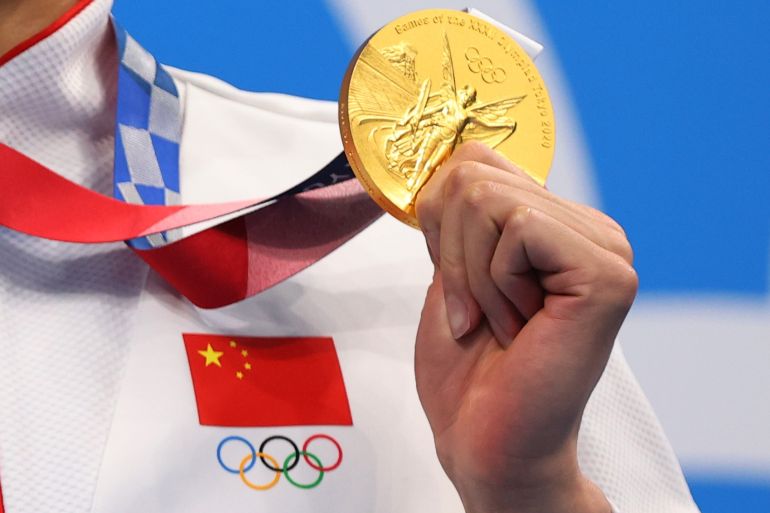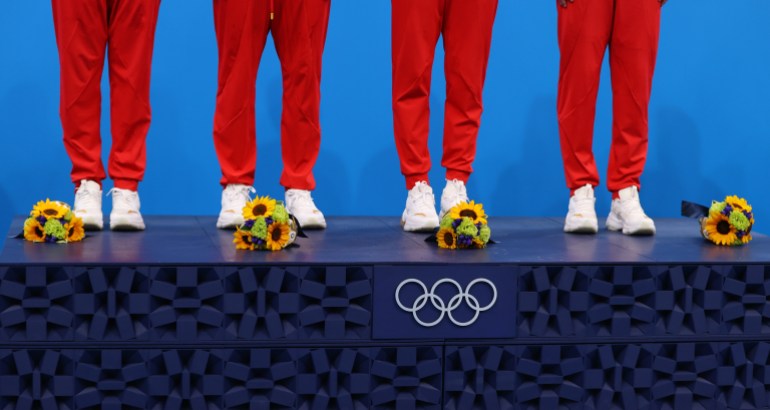What to know about Chinese Olympic swimmers’ doping scandal
Why were 23 Chinese swimmers allowed to compete at the Tokyo Olympics despite testing positive for a banned drug?

China has dismissed reports alleging its swimmers tested positive for a banned substance before the Tokyo Olympics in 2021 but were allowed to compete by world governing bodies and several of these swimmers went on to win medals, including gold.
China responded after several athletes, coaches and government officials expressed outrage at the revelations, which first surfaced on Saturday when a number of media outlets reported that 23 Chinese swimmers had tested positive for a banned drug.
Keep reading
list of 4 itemsThe dark underbelly of Pakistan’s male body image revolution
‘You need to be tough’: Child athletes make history, but at what cost?
Swimmer Adam Peaty: ‘I’ve been on a self-destructive spiral’
“The relevant reports are fake news and not factual,” Chinese Ministry of Foreign Affairs spokesman Wang Wenbin said on Monday.
“The Chinese swimmers involved were neither at fault nor guilty of negligence, and their behaviour did not constitute a doping violation,” he said at a news conference in Beijing.
“After an investigation, WADA affirmed the findings of the China anti-doping centre.”
WADA, the World Anti-Doping Agency, has said there was “a lack of any credible evidence” to challenge China’s version of events.
WADA also said it stands by its decision to clear the swimmers.
After a review, “the agency still stands firmly by the results of its scientific investigation and legal decision concerning the case,” WADA said in a statement.
Here’s what we know about the doping scandal and the furore surrounding it:
What did the reports say about Chinese swimmers?
Multiple media outlets – including German broadcaster ARD, The New York Times and the Australian newspaper Daily Telegraph – reported on Saturday that 23 Chinese swimmers tested positive for the banned heart medication trimetazidine (TMZ) at a domestic competition in Shijiazhuang, China, in early 2021.
The stories were based on a Chinese report in September that said the China Anti-Doping Agency reported the cases to the swimming governing body World Aquatics, then FINA, and WADA at the time.
The Times cited a review of confidential documents and emails, including a report compiled by the China Anti-Doping Agency and submitted to its global counterpart WADA.
WADA statement following outrageous comments by CEO of United States Anti-Doping Agency regarding case of 23 swimmers from China. Read more here: https://t.co/xBXWsheGI7
— WADA (@wada_ama) April 20, 2024
Why did WADA and World Aquatics clear the swimmers?
It was determined by Chinese anti-doping authorities that the swimmers ingested the substance unwittingly from tainted food and no action against them was warranted.
Wang said the China Anti-Doping Agency conducted an “in-depth and detailed” investigation into the incident, which found the athletes had ingested contaminated drugs “without their knowledge”.
WADA and World Aquatics decided not to act due to “a lack of any credible evidence” to challenge China’s version of events.
WADA told the Times it opted against pursuing the matter further after “consulting scientists and external legal counsel”.
“Ultimately, we concluded that there was no concrete basis to challenge the asserted contamination,” said WADA’s senior director of science and medicine, Olivier Rabin.
In its latest statement, WADA said it was “confident” its independent Intelligence and Investigations Department followed up on all allegations and they were “not corroborated by any evidence and thus, did not meet WADA threshold to open an investigation”.
WADA said, based on available scientific evidence and intelligence, “which was gathered, assessed and tested by experts in the pharmacology of trimetazidine (TMZ); and, by anti-doping experts”, it had no basis under the global anti-doping code to challenge the Chinese agency’s findings of environmental contamination.
WADA said the position was also accepted by World Aquatics.

What’s TMZ, the banned drug?
Trimetazidine is a prescription heart drug that is banned in athletes because it can enhance performance. It is known to help athletes improve stamina and decrease recovery times. Its use comes with the most stringent penalties under anti-doping rules.
How have other anti-doping bodies reacted?
Travis Tygart, the CEO of the United States Anti-Doping Agency, said WADA and anti-doping authorities in China swept positive tests “under the carpet by failing to fairly and evenly follow the global rules that apply to everyone else in the world”.
Tygart called the news of the Chinese positive tests “crushing” and blasted WADA’s lack of action as “a devastating stab in the back of clean athletes”.
He said the swimmers should have been suspended and publicly identified.
The US Athletes’ Commission also released a statement saying it was “disheartened and angry” at the revelations.
Statement Regarding the Chinese Swimming Investigation#cleansport #athleteadvocacy #athletevoices pic.twitter.com/eBKUB83Wpd
— Team USA Athletes’ Commission (@TeamUSA_AC) April 22, 2024
Have swimming coaches in China said anything?
Australian swimming coach Denis Cotterell, who is working with China’s top swimmers in the lead-up to the Paris Olympics in July and August, has rejected the allegations, saying China is adamant about clean sport.
Cotterell previously coached 1,500-metre (1,640-yard) freestyle world record holder Sun Yang, who is now suspended for a doping offence.
Cotterell told the Sydney Morning Herald he stood by his swimmers “100 percent ” and said any positive test results in Chinese swimming were not part of a state-run programme.
“I am happy to say I’m absolutely in support of my swimmers and dispute any suggestion of anything orchestrated,” Cotterell said.
“The suggestion that it’s systemic is so far from anything I have seen here.”
What has been the reaction from other athletes?
Former Australian Olympic champion Mack Horton said the sport has been compromised and athletes have been let down by a “failed” anti-doping system.
Horton, who refused to share a world championship podium with Chinese rival Sun in an anti-doping protest, said news of the failed drug tests was “infuriating” for the entire sporting community.
“I feel for the deserving athletes who have missed out on life-changing medal opportunities due to a failed system,” said Horton, who won a freestyle gold at the 2016 Rio de Janeiro Olympics.
“I feel for the deserving athletes at the centre of this episode. They are victim to a system which has disrespected sport in a bid to manipulate success.”